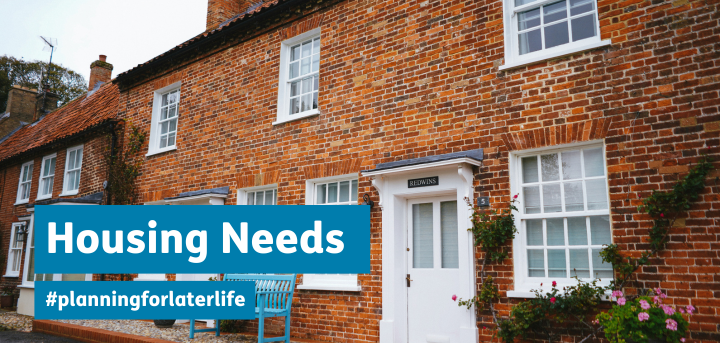Planning for Later Life: Housing Needs

Published on 22 February 2024 11:09 AM
Everyone wants to live in their own home for as long as possible. It’s a big part of staying independent. But it can become harder to manage as we get older – perhaps because of health problems, disability or bereavement.
The good news is that by making some changes at home, you can make your day-to-day life easier – and so stay independent for longer. This post looks at changes you could consider, and how to go about making them.
Read on below to find out about the changes you can make at home:
Small changes, big differences
Small changes to your home can make a big difference. Keeping walkways, such as hallways, landings, and stairs, clear and free of clutter means you’re able to easily move from room to room. This can also decrease your risk of trips and falls.
Another easy change is installing motion sensors on both internal and external lights, so they automatically come on and off. There are companies that can do this for you, or family and friends may be able to help. When it comes to lighting, swapping to touch lamps or using automatic timers for lights can make a big difference as you no longer have to reach for light switches.
There are also many different gadgets available to make life easier around the home, including grabbers, non-slip mats, long-handled shoe horns, and more. These can make everyday jobs safer and quicker. When it comes to comfort, raised toilet seats help you get on and off the toilet, while raisers for beds or chairs make standing up easier without having to spend money on new furniture. While each change feels small, it all adds up to a big difference.
Medium changes, bigger differences
Small changes can be great but sometimes you need to go a little further. Slightly bigger changes you can make include installing handrails along outside steps to help you keep your balance. If you have small steps leading up to or inside your home, then a ramp could help with mobility. There are both temporary and permanent ramp options available, depending on what you feel is most suitable for your needs.
If mobility is an issue, you could also look at installing a video doorbell or other door-entry system so you always know who’s knocking without having to move – these are readily available online or friends, family, and Age UK Norfolk can help advise you. Although they can be a little more costly and time-consuming to implement, these slightly bigger changes will make a world of difference.
Big changes, even bigger differences
If budget and time allows, there are more substantial changes you can make to your home to allow you to remain independent for longer.
Stairs can make living at home a lot harder, particularly because most of us have bedrooms on upper floors. Installing a stairlift can make getting up and down the stairs easier, particularly if it has useful features such as a swivel seat and specially adapted controls. Stairlifts must be installed by specialist companies who can discuss different options so it’s worth shopping around to find the best one for you.
Another substantial change to consider is converting your bathroom to a wet room with a walk-in shower. You could also install a side-opening bath or bath lift to make getting in and out of the tub easier. Staying in the bathroom, changing the sink and toilet to be higher can help with accessibility.
How to get help
Our friends at Age UK National have created a guide to help you stay living at home longer. You can download it here or get in touch and we can send one out to you.
You can also contact your local council or Living Made Easy (an organisation which provides free, impartial advice and information on solutions, gadgets, adaptations and aids to make life easier). For more information you can visit their website: www.livingmadeeasy.org.uk.
To contact Age UK Norfolk’s Information and Advice Helpline, call 00300 500 1217 or email advice@ageuknorfolk.org.uk.